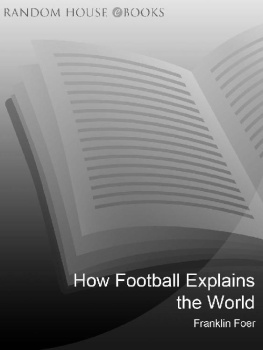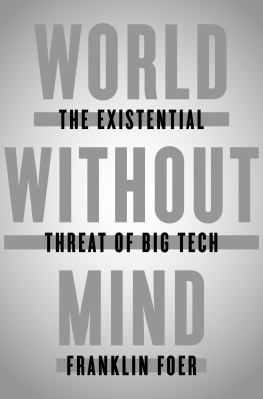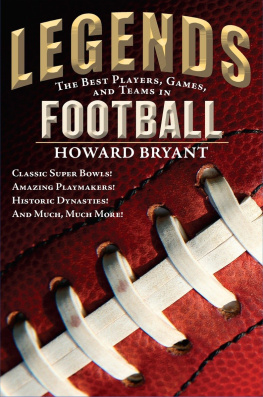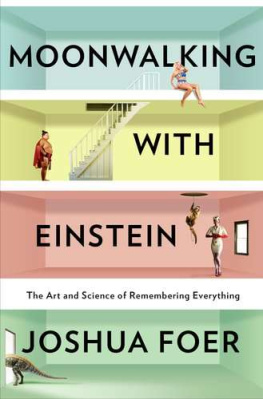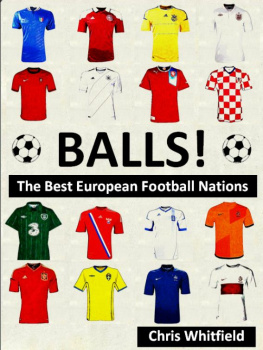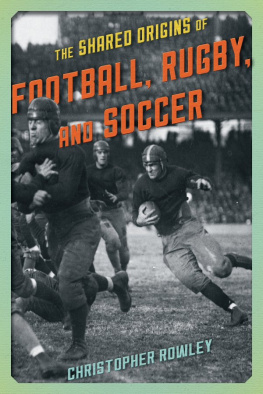Contents
About the Book
What in the world has the power to liberate women in Iran while provoking antagonism between Catholics and Protestants in Scotland, to lure Nigerians to the cold of the Ukraine while heating up class warfare in the US heartlands, and both profit local gangsters and create local and international - celebrities?
Foer presents an unexpected, uniquely revealing tour of the politics and culture of football from Milan to Tehran. He examines the games role in sustaining ancient hatreds and rivalries (Serbias Red Star and Croatias Dinamo); in supporting the migration of players and the rise of the football oligarchs (such as Silvio Berlusconi, President of AC Milan and of Italy); and in defending the virtues and vices of old-fashioned nationalism. As Foer brilliantly illuminates, the Balkan War, anti-Semitism, Jewish identity, racism, social integration, media manipulation, and American patriotism have all been influenced by, as well as have had a dramatic effect on, football.
On his travels, Foer encounters a collection of fans that is stranger than fiction: from a British hooligan with a Jewish mother, a Nazi father and a career as a soldier of fortune, to a fan club in Serbia that turns into a brutal anti-Muslim paramilitary unit. The result is an unforgettable parade of uniquely memorable fans each set into his or her unique political and cultural context.
About the Author
Franklin Foer is a staff writer for the New Republic . He lives in Washington DC. How Football Explains the World is his first book.
How Football Explains the World
An Unlikely Theory of Globalization
Franklin Foer
To Abby,
My Wife
And the Waimbergs,
My Brazilian Cousins
Prologue
I SUCK AT soccer.
When I was a boy, my parents would turn their backs to the field to avoid watching me play. I dont blame them. The games fundamental principles only dawned on me slowly, after I had spent many seasons running in the opposite direction of the ball.
Despite these traumas, or perhaps because of them, my love for soccer later developed into something quite mad. I desperately wanted to master the game that had been the source of so much childhood shame. Because I would never achieve competence in the game itself, I could do the next best thing, to try and acquire a mavens understanding. For an American, this wasnt easy. During my childhood, public television would irregularly rebroadcast matches from Germany and Italy at televangelist hours on Sunday mornings. Those measly offerings would have to carry you through the four years between World Cups. That was it.
But slowly, technology filled in the gaps. First, praise God, came the Internet, where you could read the British sports pages and closely follow the players that you had encountered at the World Cup. Then Rupert Murdoch, blessed be his name, created a cable channel called Fox Sports World, dedicated almost entirely to airing European and Latin American soccer. Now, a rooftop dish brings into my living room a feed from the Spanish club Real Madrids cable channel, as well as games from Paraguay, Honduras, the Netherlands, Scotland, and France, not to mention Brazil, Argentina, and England.
At about the same time these television stations began consuming disturbingly large chunks of my leisure time, oped columnists and economists began to talk about the era of globalization. Because I spend many of my non-soccer-watching hours as a political journalist in Washington, I found myself drawn into the thick of this discussion. Thanks to the collapse of trade barriers and new technologies, the world was said to have become much more interdependent. Thomas Friedman, the New York Times columnist and high priest of this new order, hailed the inexorable integration of markets, nation-states and technologies to a degree never witnessed beforein a way that is enabling individuals, corporations and nation-states to reach around the world farther, faster, deeper and cheaper than ever before.
As a soccer fan, I understood exactly what he meant. It wasnt just the ways in which the Internet and satellites had made the world of soccer so much smaller and more accessible. You could see globalization on the pitch: During the nineties, Basque teams, under the stewardship of Welsh coaches, stocked up on Dutch and Turkish players; Moldavian squads imported Nigerians. Everywhere you looked, it suddenly seemed, national borders and national identities had been swept into the dustbin of soccer history. The best clubs now competed against one another on a near-weekly basis in transnational tournaments like the European Champions League or Latin Americas Copa Libertadores.
It was easy to be wildly enthusiastic about the new order. These tournaments were a fans sweet dream: the chance to see Juventus of Turin play Bayern Munich one week and Barcelona the next. When coaches created cultural alchemies out of their rosters, they often yielded wonderful new spectacles: The cynical, defensive-minded Italian style livened by an infusion of freewheeling Dutchmen and Brazilians; the English stiff-upper-lip style (or lack of style) tempered by a bit of continental flair, brought across the Channel in the form of French strikers. From the perspective of my couch, the game seemed much further along in the process of globalization than any other economy on the planet.
Whats more, I could think of a further benefit of soccers globalization that had yet to be realized: Someone needed to write a book on the subject that would require the (oh-so-arduous) task of traveling the world, attending soccer matches, watching training sessions, and interviewing his heroes. For eight months, I took a leave from my job at the New Republic magazine and visited the stadiums that I most desperately wanted to see.
At about the time that I started working on this book, in the fall of 2001, the consensus on globalization changed considerablyfor obvious reasons. It was no longer possible to speak so breathlessly, so messianically of the political promise of economic interdependence. And there was another problem. The worlds brief experiment in interdependence didnt come close to delivering the advertised result of prosperity. This book tries to use the metaphor of soccer to address some of the nagging questions about this failure: Why have some nations remained poor, even though they had so much foreign investment coursing through them? How dangerous are the multinational corporations that the Left rails against?
This is not to dredge up the tired old Marxist criticisms of corporate capitalismthe big question of the book is less economic than cultural. The innovation of the anti-globalization left is its embrace of traditionalism: its worry that global tastes and brands will steamroll indigenous cultures. Of course, soccer isnt the same as Bach or Buddhism. But it is often more deeply felt than religion, and just as much a part of the communitys fabric, a repository of traditions. During Francos rule, the clubs Athletic Bilbao and Real Sociedad were the only venues where Basque people could express their cultural pride without winding up in jail. In English industrial towns like Coventry and Derby, soccer clubs helped glue together small cities amid oppressive dinginess.
By the logic of both its critics and proponents, the global culture should have wiped away these local institutions. Indeed, traveling the world, its hard not to be awed by the power of mega-brands like the clubs Manchester United and Real Madrid, backed by Nike and Adidas, who have cultivated support across continents, prying fans away from their old allegiances. But that homogenization turned out to be more of an exception than I had anticipated. Wandering among lunatic fans, gangster owners, and crazed Bulgarian strikers, I kept noticing the ways that globalization had failed to diminish the games local cultures, local blood feuds, and even local corruption. In fact, I began to suspect that globalization had actually increased the power of these local entitiesand not always in such a good way.

